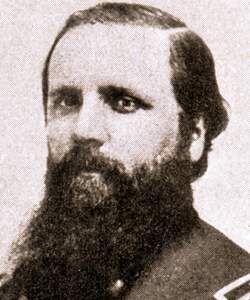Clinton Bowen Fisk (Dickinson Chronicles)
Scholarship
Clinton Fisk was born on December 8, 1828 to Benjamin Bigford and Lydia Aldrich Fisk in Western New York, near the Erie Canal. His parents moved to Michigan Territory while their son was an infant. The death of Benjamin Fisk plunged the family into poverty. Fisk eventually established himself as a small banker in Coldwater, Michigan. In 1850, he married Jeannette Crippen.
Fisk’s bank was ruined in the Panic of 1857; however, by the start of the Civil War, he had re-established himself in St. Louis, Missouri. He initially served in the home guards, participating in the seizure of Camp Jackson in May 1861. During the summer of 1862, Fisk recruited and organized the 33rd Missouri Volunteers, and was promoted that November to brigadier general. He mustered out in 1865 as a major general.
After the war, Fisk was appointed to the Freedman’s Bureau as assistant commissioner of the Bureau of Refuges, Freedmen and Abandoned Lands for Kentucky and Tennessee. In 1866, he opened a school for freedmen in an abandoned army barracks in Nashville, Tennessee. A year later the institution was chartered as Fisk University.
Fisk returned to banking in New York until 1874 when he was appointed to the Board of Indian Commissioners. He was president of the board from 1881 until 1890. In 1882 Fisk was appointed as a trustee of Dickinson College. He is credited with finding George Reed to replace James McCauley as president of the college.
In 1888, Fisk ran for President of the United States on a Prohibition Party ticket, gaining 250,000 votes. Clinton Bowen Fisk died on July 9, 1890.
Fisk’s bank was ruined in the Panic of 1857; however, by the start of the Civil War, he had re-established himself in St. Louis, Missouri. He initially served in the home guards, participating in the seizure of Camp Jackson in May 1861. During the summer of 1862, Fisk recruited and organized the 33rd Missouri Volunteers, and was promoted that November to brigadier general. He mustered out in 1865 as a major general.
After the war, Fisk was appointed to the Freedman’s Bureau as assistant commissioner of the Bureau of Refuges, Freedmen and Abandoned Lands for Kentucky and Tennessee. In 1866, he opened a school for freedmen in an abandoned army barracks in Nashville, Tennessee. A year later the institution was chartered as Fisk University.
Fisk returned to banking in New York until 1874 when he was appointed to the Board of Indian Commissioners. He was president of the board from 1881 until 1890. In 1882 Fisk was appointed as a trustee of Dickinson College. He is credited with finding George Reed to replace James McCauley as president of the college.
In 1888, Fisk ran for President of the United States on a Prohibition Party ticket, gaining 250,000 votes. Clinton Bowen Fisk died on July 9, 1890.
John Osborne and James W. Gerencser, eds., “Clinton Bowen Fisk,” Dickinson Chronicles, http://chronicles.dickinson.edu/encyclo/f/ed_fiskCB.html.



